
So – here’s a pretty good true story: the guy who invented the computer and played a key role in defeating the Nazis was hounded for his homosexuality. And The Imitation Game tells that story very well and is a pretty good movie. Benedict Cumberbatch is excellent as Alan Turing, the mathematical genius who was able to create a proto-computer that could break the codes of the German Enigma cipher machine. To make his character even more interesting, Turing had appalling, almost Asberger-like personal skills and needed to conceal his sexual preference. Cumberbatch nails the role, and will reap an Oscar nomination for his efforts.
It’s a top-to-bottom excellent English cast. Keira Knightley is especially good as Joan Clarke, the real life female codebreaker who overcame sexism and who became, briefly, Turing’s fiance.
The Imitation Game is available on DVD from Netflix and streaming on Amazon Instant Video, iTunes, Vudu, YouTube, Google Play and Xbox Video.



